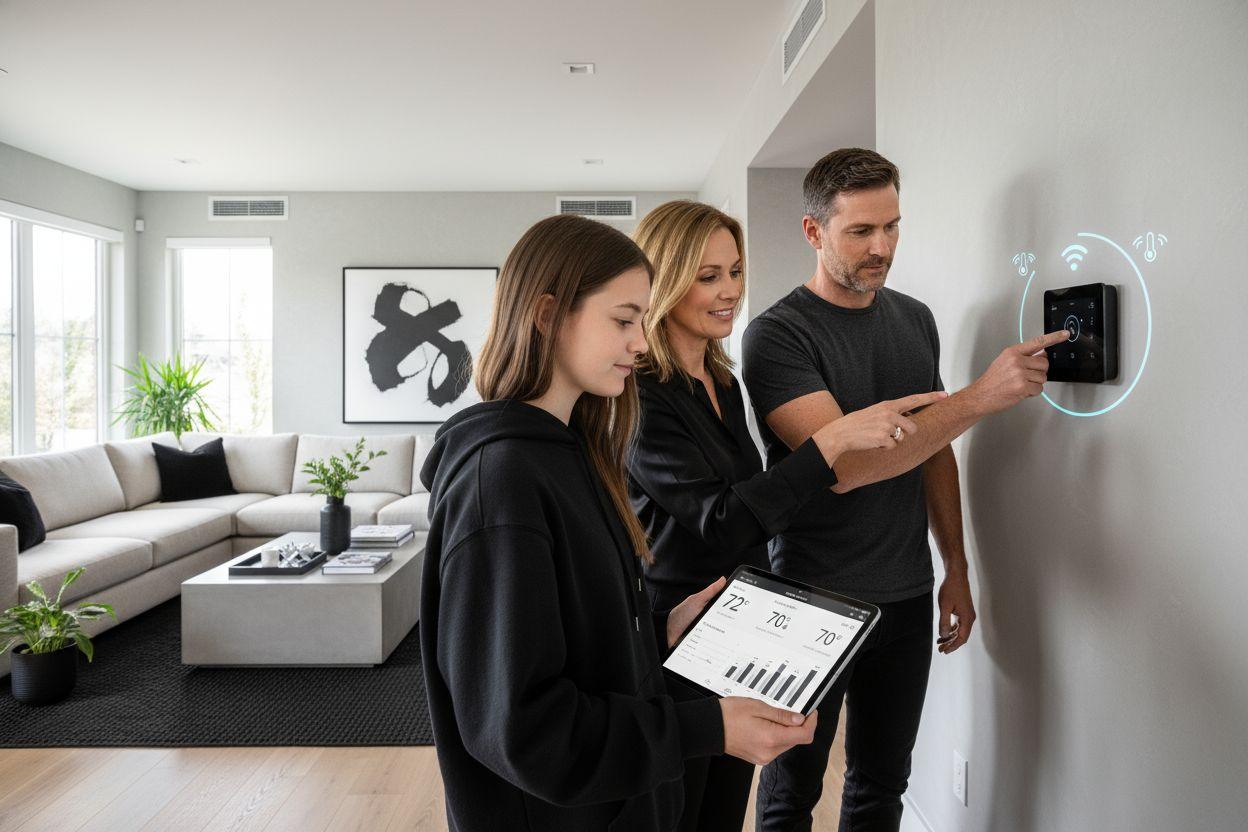
Did you know that integrating smart HVAC controls can cut daily electricity use by almost fifty percent? Smart home HVAC systems are changing how people manage comfort and energy in their homes. With features like intelligent sensors and automated controls, these systems offer more than just heating or cooling. They learn your preferences and help you use less energy while keeping every room comfortable and healthy.
Key Takeaways
| Point | Details |
|---|---|
| Energy Efficiency | Smart HVAC systems can reduce electricity consumption by up to 49% and greenhouse gas emissions by 65%, promoting both cost savings and environmental sustainability. |
| Intelligent Automation | Features like geofencing and occupancy detection allow smart HVAC systems to adapt to user preferences and routines, enhancing overall comfort. |
| Indoor Air Quality | These systems actively monitor and improve indoor air quality through dynamic airflow adjustments and advanced filtration technologies. |
| Proactive Maintenance | Smart HVAC systems provide automatic maintenance alerts and real-time performance monitoring, enabling early detection of issues and extending system longevity. |
Table of Contents
- Understanding Smart Home HVAC Systems
- Key Features Of Modern Smart HVAC
- Energy Efficiency And Cost Savings Explained
- Enhancing Indoor Air Quality And Comfort
- Maintenance, Compatibility, And Common Mistakes
Understanding Smart Home HVAC Systems
Smart home HVAC systems represent a technological leap in home comfort and energy management. These advanced systems go far beyond traditional heating and cooling setups, transforming how homeowners interact with their indoor environment. Smart HVAC systems integrate intelligent sensors, network connectivity, and automated controls to deliver precise temperature management and unprecedented energy efficiency.
According to a comprehensive 2025 study in Sustainability, integrating smart air conditioning controls can deliver remarkable energy savings. The research demonstrated that optimized scheduling and intelligent control mechanisms can:
- Reduce daily electricity consumption by approximately 49%
- Cut annual greenhouse gas emissions up to 65% compared to continuous operation
- Provide automated temperature adjustments based on occupancy and preferences
The American Standard resource explains that these sophisticated systems typically combine multiple advanced components, including:
- Smart thermostats with remote access capabilities
- Energy-efficient heat pumps and furnaces
- Integrated indoor air quality (IAQ) equipment
- Automated control systems
At their core, smart home HVAC systems are about giving you unprecedented control. Imagine adjusting your home’s temperature from your smartphone, having your system automatically adapt to your daily routines, and receiving real-time performance insights. This isn’t just convenience – it’s a smarter approach to home comfort that saves money and reduces environmental impact.
Key Features of Modern Smart HVAC
Modern smart HVAC systems are technological marvels that transform how homeowners manage indoor comfort. These sophisticated systems go beyond basic temperature control, offering intelligent automation and unprecedented user experience. Our comprehensive residential HVAC guide can provide deeper insights into these cutting-edge technologies.
According to an industry article on smart thermostats, modern systems typically include groundbreaking features such as:
- Geofencing: Automatically adjusting temperature based on your location
- Voice Assistant Integration: Compatibility with Alexa, Google Assistant, and HomeKit
- Personalized Scheduling: Creating custom comfort profiles tailored to your lifestyle
Smart home automation platforms highlight additional advanced capabilities:
- Remote monitoring through mobile applications
- Seamless integration with other smart home devices
- Auto-scheduling powered by machine learning
- Occupancy-based optimization of HVAC settings
The true power of these systems lies in their ability to learn and adapt. They don’t just react to your commands – they anticipate your needs, creating a living, breathing home environment that responds intelligently to your daily rhythms. Imagine walking into a perfectly cooled or heated space without lifting a finger, all while minimizing energy waste and reducing utility costs.
Here’s a summary of advanced smart HVAC features:
| Feature | Description | Example Technologies |
|---|---|---|
| Intelligent Automation | Auto-adjusts based on routines and sensors | Geofencing Machine Learning |
| Remote Access & Control | Manage system via phone or voice | Smart Thermostats Voice Assistants |
| Personalized Scheduling | Custom comfort profiles for each user | Scheduling Apps AI-Driven Tools |
| System Integration | Connects with other smart home devices | Home Automation Platforms |
| Occupancy Detection | Optimizes settings based on presence | Occupancy Sensors |
| Real-Time Monitoring | Live performance and air quality data | Mobile Apps IoT Sensors |
Energy Efficiency and Cost Savings Explained
Smart HVAC systems are revolutionizing home energy management by delivering unprecedented efficiency and cost savings. Energy optimization is no longer a distant dream but a tangible reality for homeowners willing to embrace intelligent technology. Our eco-friendly HVAC solutions guide can help you understand the full potential of these advanced systems.
A comprehensive 2025 sustainability study revealed remarkable environmental and financial benefits of smart HVAC technologies. The research demonstrated that intelligent systems can:
- Reduce annual carbon emissions by up to 65%
- Eliminate unnecessary energy consumption
- Create more sustainable home environments
The Energy & HVAC Association provides concrete financial insights into these systems’ potential savings:
- Up to 12% reduction in heating costs
- Up to 15% reduction in cooling expenses
- Average household savings of approximately 10% on total HVAC bills
- Additional savings through energy usage tracking and proactive maintenance alerts
Beyond immediate financial benefits, smart HVAC systems represent an investment in both personal comfort and environmental responsibility. By intelligently managing energy consumption, these systems not only reduce your utility bills but also contribute to a smaller carbon footprint. Think of it as a win-win scenario where you save money while simultaneously supporting global sustainability efforts.

Enhancing Indoor Air Quality and Comfort
Smart HVAC systems have transformed indoor environments from simple temperature control zones into sophisticated air quality management centers. These advanced systems do far more than regulate temperature – they actively monitor and improve the air you breathe. Our comprehensive guide to home air quality tips can help you understand the full spectrum of benefits.
The GreenHome Institute highlights how modern systems leverage cutting-edge technology to create healthier indoor environments. Their research reveals that smart HVAC systems with IoT sensors can:
- Dynamically adjust airflow in real-time
- Monitor and regulate humidity levels
- Implement intelligent filtration strategies
- Analyze and respond to air quality data instantaneously
These systems incorporate multiple advanced purification technologies:
- High-efficiency particulate filters
- Activated carbon filtration
- UV purification systems
- AI-driven pollutant management
Imagine having an invisible guardian constantly working to ensure your home’s air is clean, fresh, and perfectly balanced. Smart HVAC systems do exactly that – they don’t just react to temperature changes, but proactively create an environment that supports your health, comfort, and well-being. By combining sensor technology, advanced filtration, and intelligent analytics, these systems represent the future of indoor environmental control.

Maintenance, Compatibility, and Common Mistakes
Smart HVAC systems aren’t just about advanced technology – they’re about creating a seamless, proactive approach to home comfort management. System maintenance has been transformed from a reactive chore to an intelligent, predictive process. Our guide on HVAC retrofitting can provide additional insights into optimizing your system’s performance.
American Standard highlights the sophisticated diagnostic capabilities of modern smart HVAC systems, which include:
- Automatic filter change reminders
- Real-time performance monitoring
- Notifications for components operating outside optimal parameters
- Early warning systems for potential mechanical issues
The HVAC Association emphasizes several key maintenance and compatibility considerations:
- Reduce overall repair costs through proactive monitoring
- Enable early detection of operational issues
- Ensure system longevity in complex or zoned configurations
- Provide comprehensive compatibility across different HVAC infrastructure
Common mistakes homeowners make include ignoring system alerts, failing to update firmware, and not integrating their smart HVAC with other home automation systems. By treating your smart HVAC system as a sophisticated technological partner rather than a simple appliance, you can maximize efficiency, extend system life, and avoid costly repairs. Think of it like having a high-tech mechanic constantly fine-tuning your home’s comfort system.
Ready to Experience Real Smart Home HVAC Savings?
Still struggling with high energy bills or unpredictable indoor comfort? You have learned from our article that smart home HVAC systems are not just about convenience—they are about cutting your energy costs, boosting air quality, and making your Louisville or Southern Indiana home healthier and more efficient. If you want intelligent temperature control, proactive maintenance reminders, and true occupancy-based comfort, it is time to make your system work smarter, not harder. For more tips and detailed resources, explore our HVAC service and repair insights.

Discover how Project HVAC can help you upgrade to smart HVAC solutions with installation, maintenance, and same-day replacements if you call before 2PM. Visit Project HVAC to schedule your service or get a free quote today. With flexible financing, expert support, and a legacy since 1964, you can trust us to deliver comfort, savings, and peace of mind. Act now and join hundreds of local families enjoying smarter comfort every day.
Frequently Asked Questions
What are the main benefits of a smart HVAC system?
Smart HVAC systems significantly enhance home comfort, improve energy efficiency, and reduce utility costs. They also offer real-time monitoring, intelligent automation, and improved indoor air quality, contributing to a healthier living environment.
How do smart HVAC systems save energy?
Smart HVAC systems use intelligent controls to optimize heating and cooling schedules based on occupancy and personal preferences. Features like geofencing and machine learning help minimize energy waste, leading to reduced electricity consumption and greenhouse gas emissions.
Can smart HVAC systems improve indoor air quality?
Yes, smart HVAC systems actively manage indoor air quality by monitoring and regulating airflow, humidity levels, and using advanced filtration techniques. This ensures cleaner, healthier air, benefiting the overall well-being of the occupants.
What maintenance is required for smart HVAC systems?
Smart HVAC systems typically include diagnostic tools that send alerts for maintenance needs, like filter changes and performance issues. Regular updates and integration with other home automation systems are also essential to maintain optimal performance.
Recommended
- Understanding the Benefits of HVAC Upgrades – HVAC Service and Repair | Louisville, KY | Project Heating & Cooling
- 7 Top HVAC Innovations in 2025 You Should Know – HVAC Service and Repair | Louisville, KY | Project Heating & Cooling
- 7 2025 HVAC Trends Every Property Owner Should Know – HVAC Service and Repair | Louisville, KY | Project Heating & Cooling
- Residential HVAC Guide 2025: Smart Choices for Louisville & Southern Indiana – HVAC Service and Repair | Louisville, KY | Project Heating & Cooling
- HVAC DIY Maintenance How-To Guide
- Why SmartAC.com Is Your Ticket to Smarter HVAC Management – Colley Refrigeration

